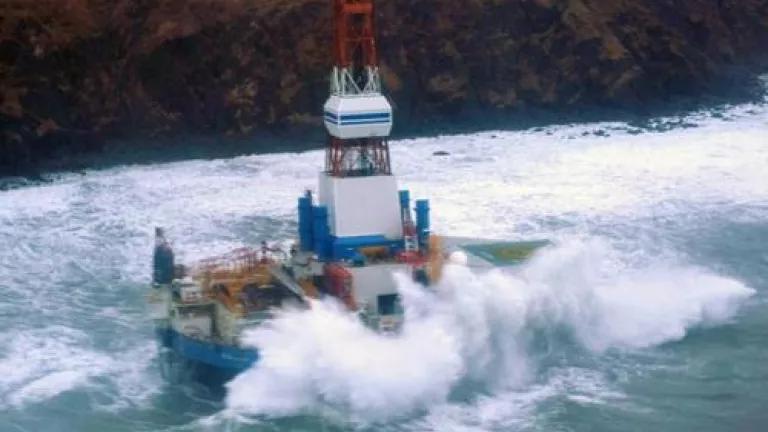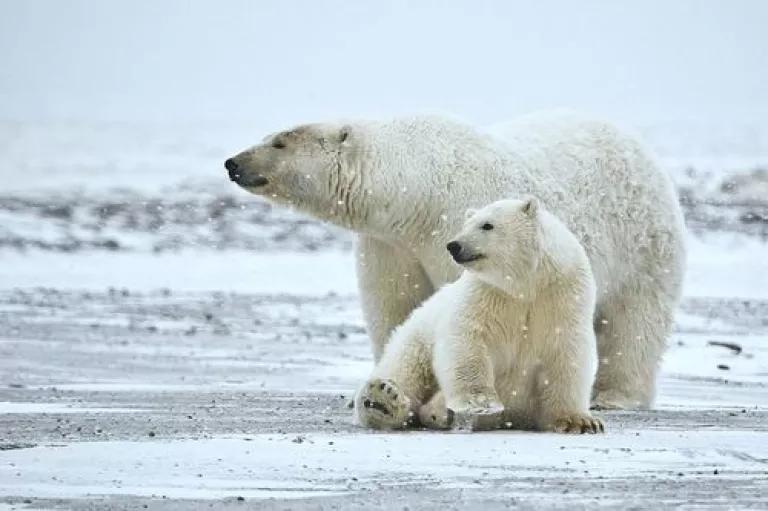
The Arctic Ocean caught a heck of a break this week, when Shell dropped its current effort to drill there for oil and gas. Great news for our last pristine sea and its extraordinary wildlife, but also for the climate, taxpayers, and even investors.
The Arctic Ocean is a terrible place to drill. Remote, wild, beset by high seas, winds, and unpredictable ice, and full of sensitive marine creatures, including species listed (or pending listing) as threatened and endangered--whales, walruses, ice seals, seabirds. Fall brings the polar ice cap, ending any hope of capping a blowout or cleaning up a spill until June or July.
It's not just insanely expensive for industry to deal with these conditions. Providing minimal safety and logistics would also cost federal taxpayers billions and divert national security resources from existing duty. That's because there's no drilling and support infrastructure in place.
That didn't stop the Bush administration from selling oil and gas leases there. Eventually, though, the daunting hurdles did persuade everyone who bought a lease to abandon drilling - except Shell. Shell soldiered on. But it encountered rough treatment from Mother Nature, aided by its own incompetence. Famously, its 2012 effort degenerated into a cascade of mistakes culminating in the wreck of the Kulluk, its subsequently scrapped drill rig.
Shell's drilling vessel Kulluk aground on the southeast side of Sitkalidak Island on January 1, 2013. Photo credit: U.S. Coast Guard.
After the Deepwater Horizon disaster, the feds tightened up on Shell. And when they didn't, or bent the rules, environmentalists were there to comment, protest, appeal, and litigate, making sure that protections got enforced. And making sure the world understood just how misguided Shell was, paying billions to pursue "someday-maybe" profits at such environmental and financial risk.
That was the context in which Shell's new CEO Ben Van Burden had to decide whether to pour billions more down an Arctic drillhole, when the one well they finally managed to complete came up a loser at the end of September.
As big a deal as this is for America's vast pelagic wilderness, it's even better for our climate. It's increasingly obvious that beating climate change means doing everything we can. We must simultaneously promote efficiency by making clean energy sources cheaper and more available, and stop opening up big new pools of carbon pollution to outcompete those alternatives.
As Pete Erickson and Michael Lazarus wrote in Nature this week "New sources of oil increase carbon dioxide emissions in the short term, and make it harder and more expensive to scale down production in the long term. This 'carbon lock-in' entrenches our dependence on fossil fuels and commits economies to higher emissions." And when the government is the one leasing the wells, it gets itself entangled in the carbon economy it should be moving us away from, with a financial stake in continued production we must reject if we want to deliver our children a climate-safe world.
Of course, Arctic Ocean oil was years, and probably decades, away from production. So Shell's effort was, in effect, a bet that the world would fail to deal with climate change, fail to move on from fossil fuels in time. Then, stuck with Shell and its dirty product, we'd be paying so much for oil that the company would finally reap a profit.
That's why it's vital that President Obama seize this opportunity, with the entire oil industry currently backing off from drilling the Beaufort and Chukchi Seas, to make sure it doesn't come back later. The President has complete authority to withdraw them from any future leasing, under section 12(a) of the Outer Continental Shelf Lands Act. As the world leader most committed to avoiding massive climate disruption, that's not a job he should leave to his successor.

The Arctic National Wildlife Refuge, a fragile region boasting iconic wildlife, is Alaska's most prominent denning ground for the polar bear. Photo Credit: Nature's Pics Online
And he can start the process of getting rid of existing leases by denying extension requests the oil giants have filed with the Interior Department. They want to hold the door open to coming back some day, returning to the risky, dirty misadventure they've so far failed at. Denying those requests swiftly is step one in ending the leasing threat. And it will provide an important signal for investors about where our energy future does and doesn't lie.
Even more importantly, headed into the Paris climate negotiations, it will tell the world that the U.S. is committed to smarter choices about energy, focusing on where and how to use existing proven fossil fuel reserves and incentivizing a rapid transition to cleaner alternatives. Not permitting risky exploration for new sources well beyond what the world's best climate scientists have determined we can burn, consistent with limiting the worst impacts of global warming.
